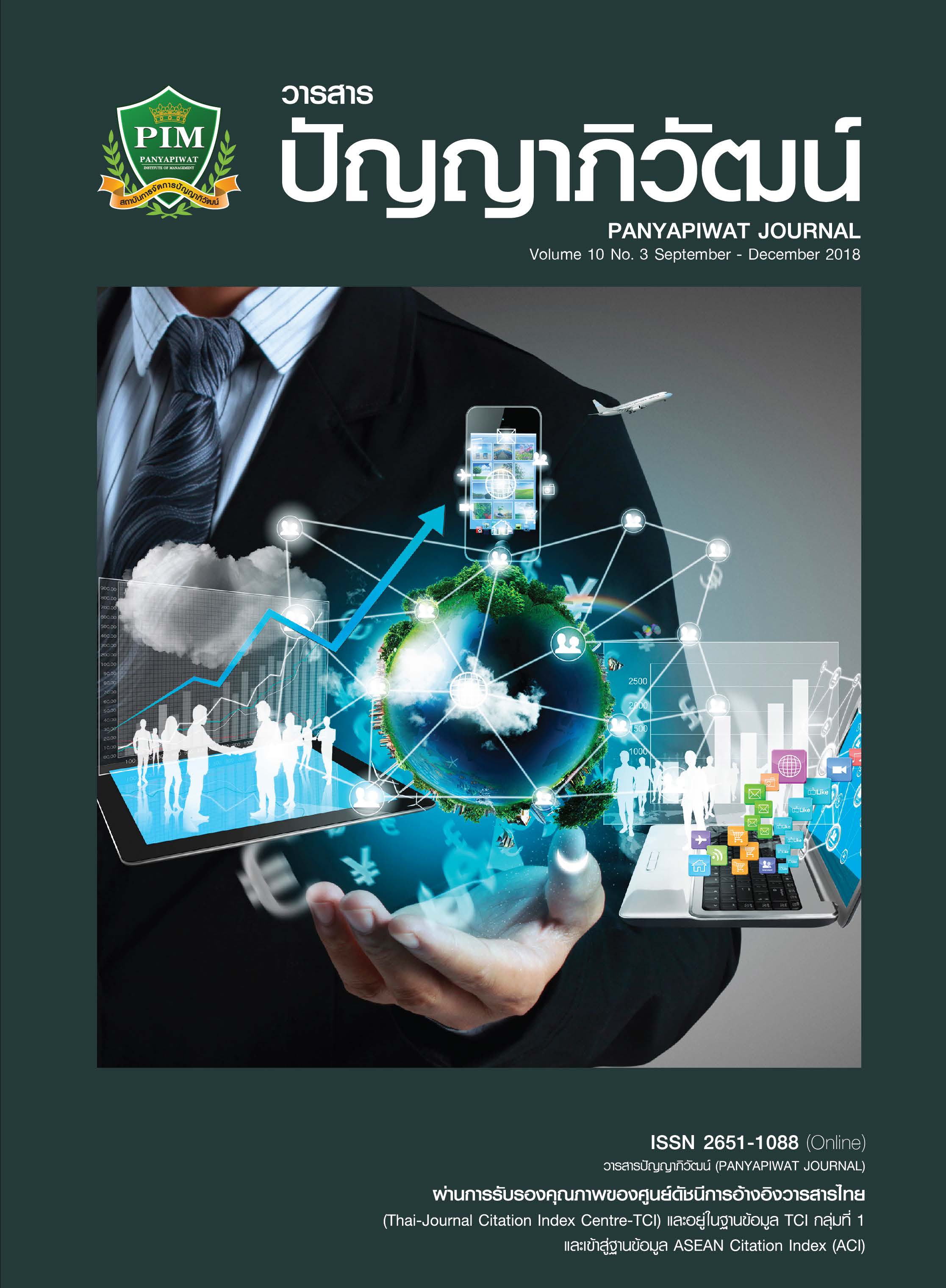ปัจจัยที่มีผลต่อทัศนคติและพฤติกรรมในการอนุรักษ์สิ่งแวดล้อมของนักเรียนระดับชั้นมัธยมศึกษาในโรงเรียนที่ตั้งอยู่ใกล้คลองสาธารณะ:กรณีศึกษา โรงเรียนทีปังกรวิทยาพัฒน์ (ทวีวัฒนา)ในพระราชูปถัมภ์ สมเด็จพระบรมโอรสาธิราชฯ สยามมกุฎราชกุมาร
Main Article Content
บทคัดย่อ
ทัศนคติและพฤติกรรมเชิงบวกย่อมส่งผลให้เกิดการอนุรักษ์สิ่งแวดล้อม งานวิจัยชิ้นนี้จึงมีวัตถุประสงค์เพื่อศึกษาปัจจัยที่มีผลต่อทัศนคติและพฤติกรรมในการอนุรักษ์สิ่งแวดล้อมของนักเรียนระดับชั้นมัธยมศึกษาในโรงเรียนที่ตั้งอยู่ใกล้คลองสาธารณะ และเสนอแนวทางการปลูกจิตสำนึกและสร้างพฤติกรรมในการอนุรักษ์สิ่งแวดล้อม ผลจากการใช้แบบสอบถามและสัมภาษณ์นักเรียนจำนวน 400 คนที่เข้าร่วมโครงการ “เยาวชนพลยุติธรรม” ของมหาวิทยาลัยมหิดล และผลจากการวิเคราะห์ถดถอยพหุคูณแต่ละขั้นตอนพบว่า ปัจจัยทางครอบครัว ปัจจัยทางโรงเรียน และปัจจัยทางชุมชน มีผลต่อทัศนคติและพฤติกรรมเกี่ยวกับการอนุรักษ์สิ่งแวดล้อม ได้อย่างมีนัยสำคัญทางสถิติ (p-value < 0.05) โดยการแสดงบทบาทที่ดีและการทำกิจกรรมการอนุรักษ์สิ่งแวดล้อมของสมาชิกในครอบครัว การให้ความรู้เกี่ยวกับการอนุรักษ์สิ่งแวดล้อมของโรงเรียน และการสนับสนุนกิจกรรมการอนุรักษ์สิ่งแวดล้อมของชุมชน ส่งผลให้นักเรียน โรงเรียนทีปังกรวิทยาพัฒน์ (ทวีวัฒนา)ฯ สร้างทัศนคติในการอนุรักษ์สิ่งแวดล้อมที่ตัวของนักเรียนเองและสำนึกว่า การอนุรักษ์สิ่งแวดล้อมเป็นหน้าที่ของทุกคน ดังนั้นนักเรียนโรงเรียนทีปังกรวิทยาพัฒน์ (ทวีวัฒนา)ฯ จึงมีพฤติกรรมในการเฝ้าระวังดูแลรักษาสิ่งแวดล้อมในพื้นที่ สำหรับแนวทางในการปลูกจิตสำนึกและสร้างพฤติกรรมในการอนุรักษ์สิ่งแวดล้อมให้แก่นักเรียนนั้นแบ่งออกเป็น 1) ด้านครอบครัว ควรมีการเสริมสร้างความรู้ในการอนุรักษ์สิ่งแวดล้อมโดยเชื่อมโยงกับกิจกรรมของโรงเรียนให้เป็นกิจวัตร 2) ด้านโรงเรียน ควรให้ความร่วมมือกับชุมชนในการเปิดโอกาสให้นักเรียนได้รับรู้ถึงปัญหาสิ่งแวดล้อมของชุมชนอย่างแท้จริงผ่านวิชาเรียน 3) ด้านชุมชน องค์กรปกครองส่วนท้องถิ่นควรจัดบุคลากรให้ความช่วยเหลือในการปลูกฝังการให้คุณค่าในการอนุรักษ์สิ่งแวดล้อมแก่โรงเรียนและครอบครัวอย่างสม่ำเสมอ
Article Details
“ข้าพเจ้าและผู้เขียนร่วม (ถ้ามี) ขอรับรองว่า บทความที่เสนอมานี้ยังไม่เคยได้รับการตีพิมพ์และไม่ได้อยู่ระหว่างกระบวนการพิจารณาลงตีพิมพ์ในวารสารหรือแหล่งเผยแพร่อื่นใด ข้าพเจ้าและผู้เขียนร่วมยอมรับหลักเกณฑ์การพิจารณาต้นฉบับ ทั้งยินยอมให้กองบรรณาธิการมีสิทธิ์พิจารณาและตรวจแก้ต้นฉบับได้ตามที่เห็นสมควร พร้อมนี้ขอมอบลิขสิทธิ์บทความที่ได้รับการตีพิมพ์ให้แก่สถาบันการจัดการปัญญาภิวัฒน์หากมีการฟ้องร้องเรื่องการละเมิดลิขสิทธิ์เกี่ยวกับภาพ กราฟ ข้อความส่วนใดส่วนหนึ่งและ/หรือข้อคิดเห็นที่ปรากฏในบทความข้าพเจ้าและผู้เขียนร่วมยินยอมรับผิดชอบแต่เพียงฝ่ายเดียว”
เอกสารอ้างอิง
Ajzen, I. & Fishbein, M. (1975). Belief, attitude, intention and behavior: an introduction to theory & research. Reading, M.A.: Addison Wesley.
Boonkum, R. (1993). The community development workers attitudes toward the policy of establishment of the exhibition center of agricultural products: the case study of Community Development Technical Assistance Center, Region 3. Master of Social Development, National Institute of Development Administration. [in Thai]
Cheatea, M. (2013). Affecting factors on environmental conservation in school: A case study of students in secondary school of Thamvitya Foundation School Yala. Master of Science (Environmental Management), National Institute of Development Administration. [in Thai]
Chuvanichanon, C. (2009). Effect of group counseling psychology based on last instruction of the Buddha and the four noble truth to increase the academic achievement among students with GPAX below 2.00: a case study of students, mattayom suksa 3 Santirat Wittayalai School. Master of Liberal Arts, Thammasat University. [in Thai]
Cohen, J., McCabe, L., Michelli, N. M. & Pickeral, T. (2009). School climate: Research, policy, practice, and teacher education. The Teachers College Record, 111(1), 180-213.
Cordano, M., Welcomer, S., Scherer, R. F., Pradenas, L. & Parada, V. (2011). A cross-cultural assessment of three theories of pro-environmental behavior: A comparison between business students of Chili and the United States. Environment and Behavior, 43(5), 634-657.
Kalyajit, S. (2010). Handbook for Youth justice project: Know laws, reconciliation, creative to Thai society. Bangkok: Offce of Thai Health Promotion Foundation. [in Thai]
Kulophas, D. (2017). Effects of school Climate factors on students’ happiness: A case of Suankularb Wittayalai school. Panyapiwat Journal, 9(2), 132-143. [in Thai]
Offce of National Environment Board. (2015). Strategy of international cooperation for natural resources and environment 2016-2020 (draft). Bangkok: Ministry of Natural Resources and Environment. [in Thai]
Pollution Control Department. (2017). Draft of Water Quality Management Strategy in Thailand (2017-2036). Bangkok: Ministry of Natural Resources and Environment. [in Thai]
Rattivat, N. (2011). An approach and measures for teenage’s socialization: a case study in a Rajvithi Home for Girls Organization. Master of Public and Private Management, National Institute of Development Administration. [in Thai]
Royal Thai Government. (2017). King philosophy to sustainable development. Retrieved April 14, 2018, from https://www.thaigov.go.th/news/contents/details/3221 [in Thai]
Saiyos, L. & Saiyos, A. (1995). Educational Research Techniques (5th ed.). Bangkok: Suviriyasarn. [in Thai]
Sonkwan, J. (2014). A causal structural model of factors affecting behaviors of environment and natural resources conservation of High School students in Phathumthani province. In the 4th International Academic Conference
(DRLE 2014) “The developing of learning experience in real – life: Learning paradigm to ASEAN”, Faculty of Industrial Education, King Mongut’s Institite of Technology Ladkrabang. [in Thai]
Sorasuchat, A. (2015). ‘Attitude’ meaning and importance. Retrieved April 15, 2018, from www.bangkokbiznews.com/blog/detail/634487 [in Thai]
Stern, P. C., Dietz, T., Abel, T., Guagnano, G. A. & Kalof, L. (1999). A Value-Belief-Norm theory of support for social movements: the case of environmentalism. Human Ecology Review, 6(2), 81-97.
Tiansuwan, J., Aye, L., Suparus, T. & Kiatsiriroat, T. (2008). The study of current situation, problem, and trend of global and Thai social change under globalization, especially on environment and energy. Bangkok: Offce of the Education Council, Ministry of Education. [in Thai]


